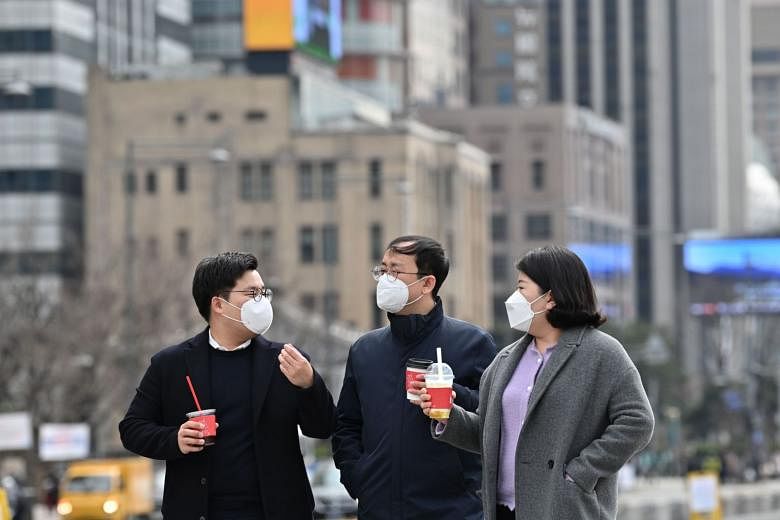SEOUL - Unless he faints or cannot walk, administrative manager Peter Cha will report for work no matter what.
Calling in sick is frowned upon in South Korea, where "good work" equals long hours in the office. Workers fear that taking the day off would inconvenience colleagues and give their bosses a bad impression of them. In any case, the country also lacks a proper sick leave system.
Observers say the social phenomenon known as noonchi - the art of gauging the situation around you and acting accordingly - combined with the deeply ingrained belief that no illness should keep one away from work, church, dance class or a funeral could have contributed to the rapid spread of the coronavirus in South Korea.
The country has reported 8,086 cases and 72 deaths as of Saturday (March 14).
In the largest cluster of cases in Seoul, some call centre employees had developed symptoms from late February but continued to work until they tested positive this week. Out of the 207 employees at a call centre in Sindorim, in south-western Seoul, at least 100 were infected.
The situation has prompted the government to set guidelines for cramped offices, which are vulnerable to mass infections, and recommend measures such as allowing employees to work from home or staggered work hours.
Seoul, home to a population of 10 million, has reported 238 Covid-19 cases, making the capital the third most infected area, after Daegu city and North Gyeongsang province, both in the south-east. The numbers are growing as more clusters emerge.
The worst health crisis in South Korean history has called into question the lack of a proper sick leave system and the lax attitude towards common illnesses such as the flu, fever and cough.
Unlike places such as Britain, Australia and Singapore, where most employees are granted paid sick leave, companies in South Korea expect employees feeling unwell to see the doctor, get some medicine and head back to work.
South Korean labour law guarantees at least 11 days of paid annual leave, but is not so clear when it comes to sick leave.
Mr Park Dong-hak, a lawyer with labour law firm Hae Myung, told The Straits Times that the Labour Standards Act and the Labour Relations Act "do not explicitly stipulate sick leave or vacations caused by personal illness".
So while civil servants are entitled to paid sick leave for common ailments, most companies will cover only major illnesses such as cancer or a broken leg. Those who are sick and require a day or two of rest will have to use their annual leave to cover their absence.
In an article entitled "A country without paid sick leave", Hankyoreh newspaper said in May last year that only seven out of 100 companies with more than 10 employees offered paid sick leave.
Even if they were entitled to it, very few employees would use it because "it all boils down to noonchi", said Mr Cha, 36, the administrative manager.
"We have a comprehensive leave system, but we are unable to make good use of it due to social relationships and concerns about workplace hierarchy," he told The Straits Times.
Mr Steve Kim, 50, has never reported sick for the past 27 years. His current employer, a government tech agency, allows three days of paid sick leave a month.
"I never felt that I was too sick to not go to work," he said. "Noonchi was a reason in the past. Now I'm too old for that. But it's good to know that we have paid sick leave, even though I've not used these welfare benefits before."
For Singaporeans working in South Korean companies, the difference in attitudes towards paid sick leave is glaring.
Ms Vanessa Loo, 36, a global business manager working in Seoul, said she was shocked to learn that South Korea had no proper paid sick leave system, and that people would go to work sick out of fear of being replaced.
"I realised I didn't know how blessed I was in Singapore, where I could take MC (medical certificate) for just a common cold," she told The Straits Times.
Sales support manager Kat Lim, 49, who used to work in a South Korean company in Singapore, recalled how her then Korean colleagues complained about Singaporeans faking illness and abusing the leave system.
"They said Singaporeans love to take MCs, and that we should stop doing it because in Korea, people crawl to work even though they are sick," she said in an interview. "We are entitled to 14 days of paid MC in Singapore, and we take it to prevent spreading germs in the office. But Koreans get praised for working hard when sick and being loyal to the company."
Some observers believe the situation in South Korea may change following the coronavirus outbreak.
For the first time in history, thousands of workers are now working from home out of fear of mass infections at the office. This includes call centres, e-commerce firms and government ministries.
A recent survey by job portal Saramin showed that 40.5 per cent out of 1,089 firms are willing to allow home-based work in order to curb the spread of the virus.
Seoul National University law professor Lee Jae-min said attitudes are already changing, especially among younger workers who are "not so shy about asking for vacation if they felt ill". But the system also needed to change, he added.
"Perhaps we should expand the sick leave system so people can use it more freely," he told The Straits Times.
"The regular Korean mindset is that the world would collapse if we stay at home instead of going to work. But now we know that nothing happens, and things are better if we stay at home. That's the silver lining of the coronavirus outbreak."
Additional reporting by Kim Yeo-joo












